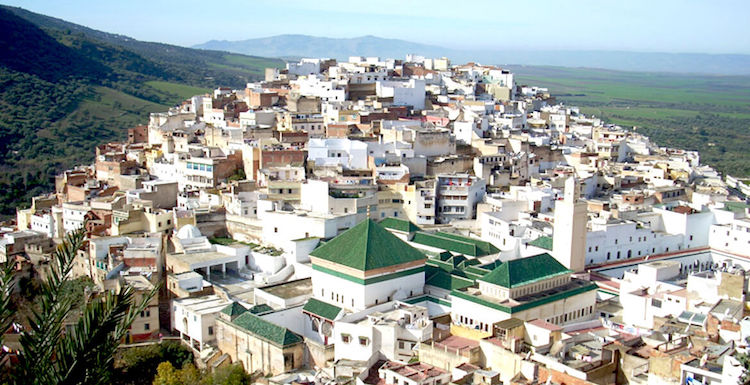
Moulay Driss Zerhoun, Morocco, Africa
Morocco is a north African country that offers a wide range of landscapes and activities that are life changing, it's a country that will absolutely draws you in.
From its colorful markets filled with the rich scents of spices, blue Mediterranean beaches and Atlantic coasts, vibrant Atlas Mountains, endless sand dunes, wadis, oases of the desert to the secret lanes from the Medinas of its beautiful imperial cities such as Fez and Marrakech.
There is just so much to see in this incredible country of dizzying diversity.
While you can have a great time hitting up the main spots as Marrakech over a few days, We highly recommend lingering in Morocco for a week or two to uncover all of the hidden treasures.
Ready to fall in love with this dynamic, gorgeous country? Here’s our Absolute Morocco travel guide, where you will find all what you need to know to make your stay in Morocco the most remarkable experience of your life.
Two to four weeks is the best length of time for a visit. Any less and you’re doing just one or two cities or a quick explore of the imperial cities such as Marrakech, Rabat, Meknes, and Fes, any more and you can go into great depth in each region, venture into the Sahara desert a few days, hike the Atlas Mountains, explore the kasbahs, and the caravan routes...
Morocco also pairs well with Spain and Portugal.
Morocco climate falls into four basic seasons: Spring (Mars-May), Summer (June-august), Fall (Sep-Nov) & Winter (Dec-Feb)
Spring is typically green and warm, summer is hot and dry, fall is warm and reasonably dry, and winter is cool and sometimes rainy. These are broad descriptions and conditions certainly vary by region. Fez, Meknes and Rabat are generally a little cooler than Marrakech. The south is always warmer and drier, while the mountains are cooler and can get cold and snowy at higher altitudes during the winter months.
To sum up, Spring and fall tend to be most idyllic months weather-wise, with predominantly sunny skies and daytime highs in the 22-30 C (72-88H) range, evenings tend to be somewhat too much cooler so pack accordingly.
You can also visit Morocco in the winter, but expect some rain and chillier temperatures. You’ll want to avoid the summer months of July and August unless you really enjoy heat.
The official language of Morocco is Berber and Arabic, in the Moroccan streets, you’ll hear a flurry of languages including English, French, Spanish, Arabic, and Berber.
Most plugs in Morocco are type C and type E. The standard voltage is 220 V and the standard frequency is 50 Hz. Plugs are usually two-pin in the round european style and some include a third, female contact to accept the grounding pin in the socket.
A universal adapter will work for most electronics (be sure to get one with surge protection!) but you may need a converter for hair dryers and hot tools.
If you are traveling to Morocco, be careful with the clock. After decades of daylight savings time, the country has decided, to drop clock changes. While GMT and other time zones “fall back”, Morocco will stay the same. The country has decided to stick with a year round GMT+1 Time Zone. However, note that during Ramadan, time zone fall back to GMT+0.
It’s hard to know if digital devices will automatically catch on to the new decision to stay on one time all year round, when they were clearly expecting to switch. For this reason, it might be worth dusting off your trusty old watch and setting it manually to GMT+1. You’d certainly hate to get to the airport only to find out that you are hours early, or late.
No visas are necessary for full passport holders from the UK, Ireland, the USA, Canada, Australia, New Zealand or any EU and they can remain in the country for up to ninety days. However, it is always worth checking the visa requirements before your departure as these can change. Upon arrival, you will need to fill in a form with personal details, profession and purpose of visit.
There are direct flights to Morocco from most European country as well as from New York, Tel Aviv and you can fly via Paris or most other European cities. No shots are required for your entry into Morocco, however, it's always better to visit a travel health clinic before your departure to make sure you have all the vaccinations you need.
Morocco is safe, peaceful, and stable witch make it an easy gateway into Islamic travel. The country is known for being one of the most tolerant of the Arab nations. Moroccan people, both Arabic and Berber, are also noted for their warm hospitality and warm, friendly nature. Morocco is the perfect destination for families and culture vultures because it’s so colourful, multifaceted and offers plenty of outdoor activity and experiences.
Morocco is a country that draws you in. From the colorful, heady markets filled with the rich scents of spices, the vibrant Atlas Mountains, the timeless walled city of Fez, the bustling medina in Marrakech and viewing local Berber life in the ruggedly beautiful High Atlas Mountains to staying at exclusive Desert Tented Camp nestled among the soaring dunes of the Sahara Desert, there is just so much to discover in this incredible North African country. See our recommended journeys to Morocco.